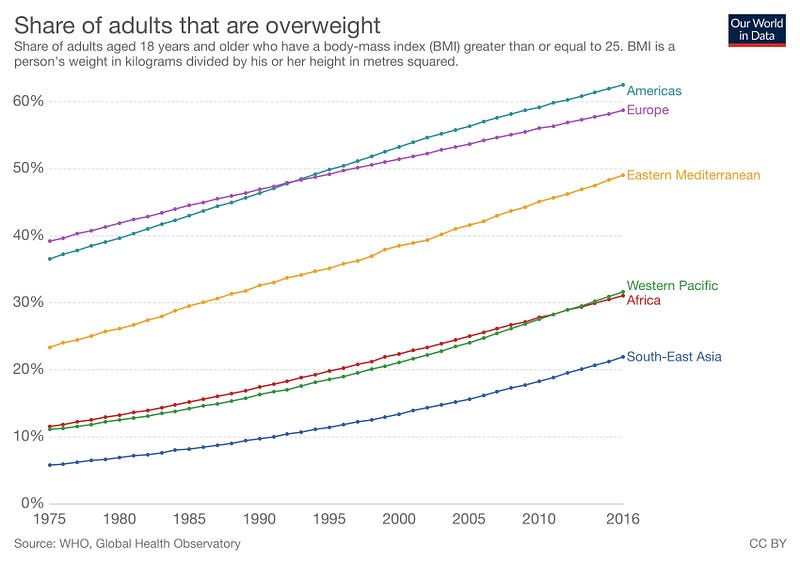The Health Effects of Obesity.
The world has always been dealing with health issues related to obesity and overweight. And over the year, the number of people that were struggling with obesity continues to increase.

Obesity is a situation in which a person has a dangerous body fat content or an unhealthy body fat distribution. It increases the risk of multiple serious problems in health. Excess body fat places bones and organs under pressure. It also causes complex hormone and metabolism changes and increases the body’s inflammation.
There are lots of things that could cause obesity, one of the most common things is people tend to consume too many calories in their daily life.
When a person consumes more calories than they use as energy, the extra calories will be stored as fat by their body. This may result in excess weight and obesity.
Besides that, the second most common reason people have obesity is that they are not sleeping enough. Studies have indicated that the lack of sleep increases the risk of weight gain and obesity development.
Experts surveyed data from 1977 to 2012 for more than 28,000 children and 15,000 adults in the UK. In 2012, they found that sleep deprivation in both adults and children substantially increased the risk of obesity. Also, when a person does not sleep sufficiently, their body produces ghrelin, an appetite-stimulating hormone. Simultaneously, a lack of sleep often leads to lower leptin production, a hormone that suppresses the appetite.
Based on medalerthelp.org, these are a couple of facts about obesity that we have been dealing with:
— Worldwide, more than 1.9 billion adults were reported as overweight.
— The obesity rates in the US were 39.8% in adults and 18.5% in youth in 2015–2016.
— The obesity epidemic accounts for an estimated 300,000 fatalities per year.
— 90% of the people living with type 2 diabetes are obese.
— In 2016, 340 million kids and teenagers ages 5 to 19 were overweight or obese.
— In many cases, just losing 10% of your present weight can greatly reduce the danger of multiple illnesses.
— The childhood obesity statistics indicate that kids struggling with obesity are 70% more likely to continue to be affected by obesity in adulthood.
— A person’s body mass index is heritable at rates of 25%–40%.
— The prevalence of the overweight epidemic in children increased from 4.8% to 6.2% between 1990 and 2015.
— The Organization for Economic Cooperation and Development projects a steady rise in the rate of obesity, which will continue until 2030 at the very earliest.
With all the facts that have been stated, we could conclude that obesity is a serious matter and must be dealt with.
But the question is, how do we measure obesity?

The most common way to measure ‘obesity’ itself is by looking at the body mass index (BMI) scale. The World Health Organization (WHO) defines BMI as: “a simple index of weight-for-height that is commonly used to classify underweight, overweight and obesity in adults. It is defined as the weight in kilograms divided by the square of the height in meters (kg/m). For example, an adult who weighs 70kg and whose height is 1.75m will have a BMI of 22.9.”
With that being said, we could easily calculate our own BMI. But getting a risk factor such as obesity does not mean that the following health problems may arise. But it improves the opportunities to develop one or more of them.
Obesity is a severe health issue that needs to be addressed immediately as it might cause many diseases.
Here is the list of diseases that obesity could cause:
· Type 2 diabetes
· High blood pressure
· Heart disease and strokes
· Certain types of cancer
· Sleep apnea
· Osteoarthritis
· Fatty liver disease
· Kidney disease
· Pregnancy problems, such as high blood sugar during pregnancy, high blood pressure, and increased risk for cesarean delivery (C-section)
Yes, there are a lot of things that could happen if you are obese.
But there are steps to prevent unhealthy weight gain and related health problems, whether you are at risk of obesity, moderately overweight or at a healthy weight.
Based on mayoclinic.org, here are the steps to reach a healthy weight, and surprisingly, the steps to prevent weight gain are the same as the steps to lose weight:
· Exercise regularly. To stop weight gain, you need to get 150 to 300 minutes of moderate-intensity exercise per week. Physical activities that are fairly vigorous include fast walking and swimming.
· Follow a healthy-eating plan. Focus on low-calorie, nutrient-dense foods, such as fruits, vegetables, and whole grains. Avoid saturated fat and limit sweets and alcohol. Eat three regular meals a day with limited snacking. You can still enjoy small amounts of high-fat, high-calorie foods as an infrequent treat. Just be sure to choose foods that promote a healthy weight and good health most of the time.
· Know and avoid the food traps that cause you to eat. Identify situations that trigger out-of-control eating. Try keeping a journal and write down what you eat, how much you eat, when you eat, how you’re feeling and how hungry you are. After a while, you should see patterns emerge. You can plan ahead and develop strategies for handling these types of situations and stay in control of your eating behaviors.
· Monitor your weight regularly. People who weigh themselves at least once a week are more successful in keeping off excess pounds. Monitoring your weight can tell you whether your efforts are working and can help you detect small weight gains before they become big problems.
· Be consistent. Sticking to your healthy-weight plan during the week, on the weekends, and amidst vacation and holidays as much as possible increases your chances of long-term success.

